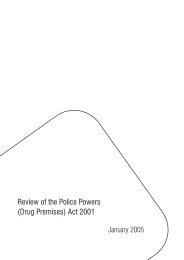Crimes (Forensic Procedures) Act 2000 - NSW Ombudsman - NSW ...
Crimes (Forensic Procedures) Act 2000 - NSW Ombudsman - NSW ...
Crimes (Forensic Procedures) Act 2000 - NSW Ombudsman - NSW ...
You also want an ePaper? Increase the reach of your titles
YUMPU automatically turns print PDFs into web optimized ePapers that Google loves.
second because the orders we were able to locate contained very little information. They included objective details,<br />
like the suspect’s name and the type of procedure. But there was no record of the reasons supporting the decision to<br />
conduct the procedure, in particular the grounds for believing the suspect committed the offence, or the reasons why<br />
carrying out the procedure without consent was justified in all the circumstances. 558 Without this information, we were<br />
unable to determine whether the procedure was properly authorised. In our view, there would be considerable merit in<br />
the person making the order recording:<br />
• what the reasonable grounds are for believing that the suspect committed an offence<br />
• what the reasonable grounds are for believing that the procedure might produce evidence tending to confirm<br />
or disprove that the suspect committed the offence,<br />
• whether it was possible to give the suspect the opportunity to provide a submission, and if so, the nature of the<br />
submission, and<br />
• why the carrying out of the procedure without consent is justified in all the circumstances.<br />
Recording the reasons for making an order would be of benefit to <strong>NSW</strong> Police because it would demonstrate that<br />
the senior officer making the order had sufficient knowledge of the circumstances before deciding to order a forensic<br />
procedure.<br />
As with the requirement that police only request consent in circumstances where it is justified, we are of the view that<br />
further guidance should be given to police officers about when carrying out a forensic procedure without consent will<br />
be justified in all the circumstances. This is consistent with the view of the Legislative Council Standing Committee on<br />
Law and Justice. 559<br />
Justice Kirby has commented on this matter:<br />
Amongst the considerations which need to be taken into account in placing effective controls over the<br />
procurement of body samples from individuals for DNA testing [is] that where an individual objects to the<br />
provision of a body sample, whether for DNA testing or otherwise, such objection is decided by reference to<br />
legal criteria which take into account the need to establish a strong reason to authorise the state to extract a<br />
body sample from a suspect in the face of that person’s non-consent. 560<br />
The model code suggests that, before ordering a forensic procedure, the senior police officer should consider,<br />
in addition to the issue of non-consent, the seriousness of the offence and the circumstances surrounding its<br />
commission, the degree of the suspect’s alleged participation, whether evidence of the suspect’s involvement in<br />
the offence can be gained in a less intrusive way, any reasons given for refusing consent and, in the case of DNA<br />
samples, whether a comparison sample from the crime scene has been or is going to be obtained. This is perhaps at<br />
least some appropriate guidance to senior police officer when considering an order.<br />
Recommendation 20<br />
The form used for recording senior police officer orders be amended so that the senior police officer who<br />
makes an order authorising a forensic procedure can record their reasons for believing the suspect committed<br />
an offence, the grounds on which the officer believes the procedure might produce evidence tending to<br />
confirm or disprove that the suspect committed the offence, and the reasons why carrying out of the procedure<br />
without consent is justified in all the circumstances. The amended form should also include information about<br />
any submissions received from the suspect, their legal representative or interview friend. Any amended form<br />
for senior police officer orders should also be included in the proposed forensic processes book.<br />
Recommendation 21<br />
The <strong>Crimes</strong> (<strong>Forensic</strong> <strong>Procedures</strong>) <strong>Act</strong> <strong>2000</strong> be amended to provide clearer guidance to senior police officers<br />
about when carrying out a forensic procedure without consent will be “justified in all the circumstances”,<br />
including factors which must be considered in making this decision.<br />
102<br />
<strong>NSW</strong> <strong>Ombudsman</strong><br />
DNA sampling and other forensic procedures conducted on suspects and volunteers under the <strong>Crimes</strong> (<strong>Forensic</strong> <strong>Procedures</strong>) <strong>Act</strong> <strong>2000</strong>

















